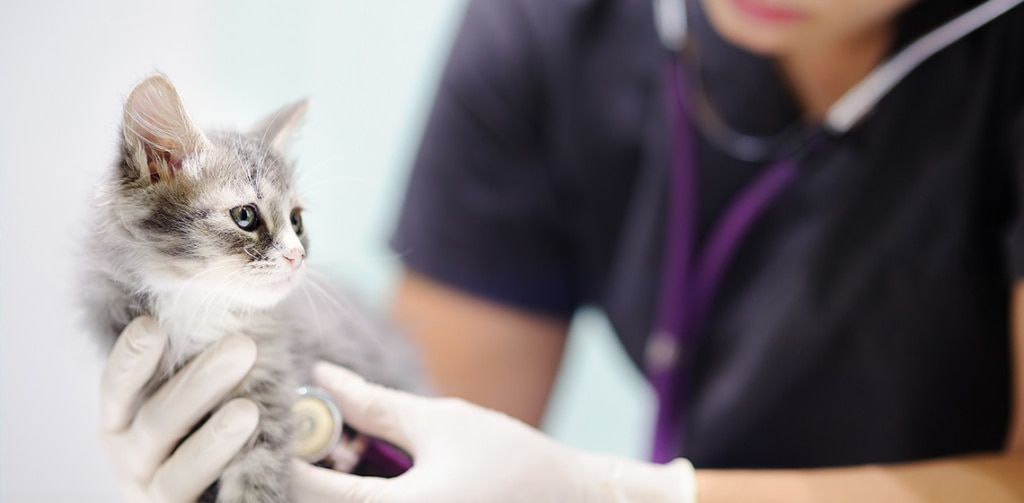If you’re responsible for the care of a young kitten, either as a breeder, fosterer, or rescuer, you’re probably familiar with the term Fading Kitten Syndrome. However, you might not be aware of the causes, symptoms, and treatment options. Since kittens have a better chance of surviving Fading Kitten Syndrome if the signs are spotted promptly, it’s essential to know what to look for and what you can do to help.
Table of Contents
What is Fading Kitten Syndrome?
Fading Kitten Syndrome isn’t one illness or condition; it’s a term describing the signs that a neonatal kitten’s health is quickly going downhill. The neonatal period is classed as between birth and weaning, typically at around six weeks. Fading Kitten Syndrome tends to affect kittens during this period, with most affected in the early days after birth. Because young kittens have a weakened immune system and no energy reserves, their health can deteriorate rapidly. Therefore, sadly, Fading Kitten Syndrome often causes kitten death.
Fading Kitten Syndrome usually affects kittens between birth and six weeks old. Once they are weaned, the risk is much less.
What causes Fading Kitten Syndrome?
There is no one cause of Fading Kitten Syndrome, but there are many factors that can trigger a kitten to become unwell and start the cascade of events that result in serious illness. These can include anything that causes them to feed less, lose weight, lose body heat, become dehydrated, or generally fail to thrive. Potential triggers include congenital abnormalities like cleft palates, viral and bacterial infections, and parasites like fleas and worms. However, other factors can also make kittens more likely to “fade,” including being part of a large litter, being rejected by their mother, or being hand-reared.
What are the symptoms of Fading Kitten Syndrome?
The initial symptoms of Fading Kitten Syndrome can vary depending on the cause. For instance, if your cat has large numbers of worms, the first sign of them failing to thrive might be a bit of diarrhea or failure to gain weight. On the other hand, if your kitten has an airway infection, you might notice them sneezing or having runny eyes and nose. The first signs that the vicious cycle of Fading Kitten Syndrome has started are that your kitten is lethargic, less interested in feeding, toileting less, or failing to gain weight.
From this point, your kitten may become very weak, and they may look visibly gaunt in the face. If you look at their gums, they might be a little pale, and if you lift the skin of their scruff, you might notice it doesn’t spring back into place. These signs suggest that your kitten is severely dehydrated and at risk of death.
It’s important to keep an eye out for any symptoms, including lack of weight gain and lack of interest in feeding.
Can Fading Kitten Syndrome be treated?
The earlier you spot that your kitten is failing to thrive, the sooner treatment can begin. When caught early, the chances of preventing serious illness are higher, so treatment is more likely to be successful. Worms and fleas can easily be treated with parasite treatments, and mild infections often respond to antibiotics.
However, if treatment is delayed, there are often secondary, more severe symptoms like dehydration, low blood glucose, low body temperature, or anemia. These more severe symptoms can sometimes be treated with a fluid drip, blood transfusions, and intensive nursing care, but sadly the treatment often fails. The later stages of Fading Kitten Syndrome are nearly always fatal despite treatment, making it a heartbreaking and frustrating condition.
How can I stop my kitten from getting Fading Kitten Syndrome?
Strict monitoring of your kitten is the most important thing you can do to help them stay healthy. Checking their weight daily with an appropriate scale and noting every successful feed and toileting attempt will help you spot when things aren’t right. Once you notice that your kitten isn’t one hundred percent, it’s essential not to delay seeking advice from your veterinarian. You might worry that we will think you are jumping the gun or overreacting, but our veterinary team are all too aware of how quickly a minor ailment can become a severe issue, especially when it comes to youngsters.
Keeping your kitten up to date with parasite treatment and watching out for sneezing, diarrhea, and other signs of infection will help to reduce the chances of your kitten going downhill. Unfortunately, even with excellent care from their pet parent and intensive intervention from their veterinarian, many kittens with Fading Kitten Syndrome continue to deteriorate until they die or are euthanized.
So, what should I do if I think my kitten might have Fading Kitten Syndrome?
If your young kitten is not following their normal weight and feeding patterns, or if they have any symptoms of illness, you should speak to a member of our veterinary team right away. Treatment is more likely to be successful before serious symptoms like dehydration, low blood sugar, and hypothermia start. So, to give your little one the best possible chance of survival, don’t delay getting help.
FAQ
Fading Kitten Syndrome is sadly often fatal. However, if the early signs of illness or failure to thrive are noticed promptly, treatment is more likely to succeed. So, it’s important to keep an eye out for any symptoms, including lack of weight gain and lack of interest in feeding.
It’s hard to determine the exact point when a kitten is classed as having Fading Kitten Syndrome, but you might notice that your kitten is failing to thrive, failing to gain weight, losing interest in feeding, or becoming lethargic.
Fading Kitten Syndrome usually affects kittens between birth and six weeks old. Once they are weaned, the risk is much less. Kittens who have been rejected by their mother or have to be hand-reared are more likely to be affected.
Kittens go downhill very quickly when it comes to their health. Even if your kitten has seemed fine until very recently, if they are not feeding, toileting, or moving much, and if they appear weak or have labored breathing, they could be dying.

Dr. Hannah Godfrey MRCVS graduated from the Royal Veterinary College in 2011. Although she initially worked in mixed practice treating all species, she found a love for small animal work and has worked exclusively with dogs and cats since 2014. She lives in Wales with her partner, son, and two cats (named Poppy and Ashton Kutcher), and writes comedy fiction in her spare time.








